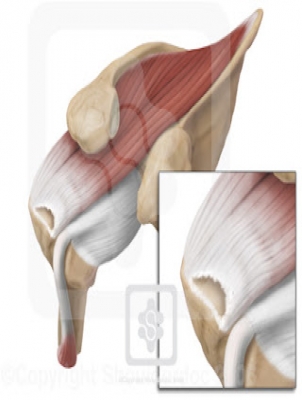The rotator cuff is a muscle tendon unit in the shoulder that helps to coordinate the smooth mechanics of the joint. It is made up of 4 tendons named the supraspinatus, infraspinatus, teres minor, and subscapularis. Unfortunately, this thin and delicate structure is prone to tears, especially in active adults who are approaching middle age.
A common scenario I face is that of a patient who has a rotator cuff tear found on their MRI. Patients naturally ask what they should do about the tear. Some people feel strongly that anything "abnormal" should be fixed. Others focus more on their symptoms and how well they can function despite the tear in their rotator cuff.

A medium size tear of the supraspinatus tendon of the rotator cuff (image courtesy of shoulderdoc.co.uk)
Here's an interesting article from the Journal of Shoulder and Elbow Surgery. It documents the results of a well done prospective randomized trial comparing patients who had surgery to those who had physical therapy and avoided surgery for acute rotator cuff tears. There were roughly 30 patients randomly selected for each arm of the trial. The average age of the subjects was about 60. Results were graded by use of a patient rated outcome survey (Constant-Murley score). They also repeated the MRI at 1 year to compare changes.
The interesting result they reported was that patients rated the result very well in both groups. Those who had surgery had a constant score of 83, while the therapy only group scored 78. The differences were not statistically significant. Those who had repairs had a 6.5% retear rate on their repeat MRI. 29.2% of those who did not have a repair showed an increase in tear size of > 5mm.
Conclusion:
We have seen similar results in patients with chronic or degenerative type tears. This study is interesting because it showed that new or acute tears also enlarge with time in a third of patients who chose not to have surgery. Despite that, patients rated their function about the same with or without surgery. I obviously counsel my patients about these results. Many choose not to have the surgery. However, many are concerned about the potential for the tear to get bigger and irreparable as time goes on.


